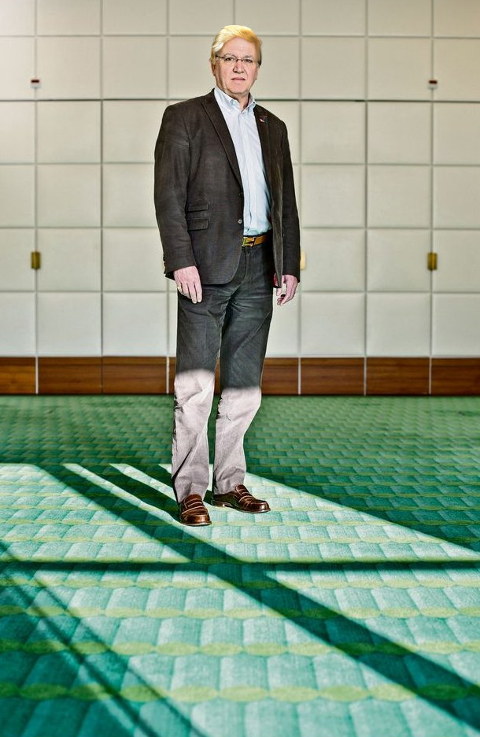

THERE IS some bad news regarding the EPO, as it turns out that the Dutch court is unwilling to do anything about Eponia's abuses (the photo in the article has been changed for some reason, but we got a copy and modified it slightly). "Excellent article," called it an anonymous insider. "Bravo to Mr König and the NRC. Translation desperately needed for our non-dutch speakers..."
Patent Office in Rijswijk remains immune
European Patent Office
The European Patent Office in Rijswijk, and its temperamental chief Battistelli, get a lot of criticism. Judges in the Netherlands are not allowed to intervene.
Can an employer in the Netherlands have a private investigator interrogate employees without a lawyer present? Is he allowed to dismiss union leaders or decrease their salary or pension? Is he allowed to refuse to labor inspections after a suicidal employee jumps out of a window of the office?
It all happened at the European Patent Office in Rijswijk. And Dutch judges are unauthorized to decide about the patent office. That's what the Supreme Court on confirmed on Friday in a long-awaited decision. The Patent Office is an international organization which enjoys legal immunity in the Netherlands, says the Supreme Court.
In other words, the patent office is a kind of legal island in the Netherlands. The Supreme Court verdict is important for all forty international organizations in the Netherlands, such as the International Criminal Court and the European Space Agency. For union SUEPO of the patent office this is a severe setback.
The Bureau approved patent applications and grants patents that are valid in all 38 member countries. With clients such as Philips, Samsung, LG and Siemens, the patent office is important for the European market protection. The agency employs 7,000 specialist, well-paid workers in Germany, Austria, Belgium and the Netherlands.
Temperamental CEO
The patent office is also notorious for his temperamental French President Benoît Battistelli (66). The CEO has long been at war with SUEPO union, which claims to represent half of the staff, but is not officially recognized. Last year, three union representatives have been dismissed and three others have been demoted. SUEPO denounces the pressure of work, authoritarian management and legal status of employees.
The battle hardened when the Hague Court of Appeal ruled in early 2015 that the agency should not limit strikes, union emails should not be blocked and the union must be recognized. Then Minister of Justice Ivo Opstelten (VVD) ordered bailiffs not to execute the judgment in order to ensure the immunity of international organizations: an unusual situation.
The patent office then went in appeal to the Supreme Court, with the support of the Dutch state, which joined as a party. The Netherlands doesn't want to drive out other international organizations, because it is bad for the reputation of the business climate and the economy. Battistelli delicately reminded the Cabinet last year that his office adds "1 billion" in sales to the Dutch GDP and invests "250 million" in a new high-rise building.
The Supreme Court has reversed earlier judgments of the preliminary court and the Hague Court. Labor rights are sufficiently protected by the internal disputes procedure. They can also appeal to the International Labour Organisation in Geneva.
But the dispute procedure is shaky and the road to Geneva is long, employees say. All that remains now is one solution SUEPO's lawyer Liesbeth Zegveld said prior to the Supreme Court:"A lawsuit against the Dutch state because the violation of trade union rights take place on Dutch territory. Does the state do enough to prevent this? The answer is no."
Exploitation
Next month a parliamentary debate on the working conditions will be held. In a parliamentary debate last month, the patent office has already been criticized by SP and D66 and government parties PvdA and VVD. The PvdA cited the example of exploitation of Libyan and Sudanese staff in London. Didn't a British judge allow the European Convention on Human Rights to still outweigh the "diplomatic immunity"?
The conflict forces Netherlands in a strange dilemma. The state supported the patent office in the courtroom, but at the same time the government is critical. Secretary Martijn van Dam (Economic Affairs, Labour) recently expressed in a letter his concern about the "difficult relationship between unions and senior management." During the introductory interview which Van Dam held with Battistelli last year the Frenchman walked out the meeting in anger.
The Dutch patent world is concerned, says a spokesman for Economic Affairs. The Netherlands are represented by Derk-Jan de Groot, director of the Netherlands at the Patent Office. Together with other major patent countries like Germany, France, Sweden, Switzerland and the Netherlands is among the critical countries.
The problem is that the management board of all Member States, the highest body is too big and too diverse to reach a solution. Last year there seemed to have been a revolution, when 26 of the 38 Member States (with 12 abstentions) called Battistelli to a halt. They asked for arbitration in the conflict, cessation of ongoing proceedings against trade unionists and reform of sanctions. But almost all the proposals have been delayed, hence the situation "has not improved," according to a spokesman for Economic Affairs. One SUEPO member who was overwrought and therefore on sick leave at home, was subsequently fired. It seems that all parties are intent to let Batistelli serve out his second term which ends on June 30 next year.
The patent office welcomes the "confirmation of the legal immunity" by the Supreme Court and "will continue to work to strengthen the social dialogue," a spokesman said.